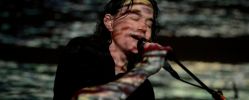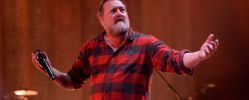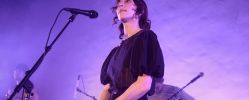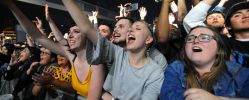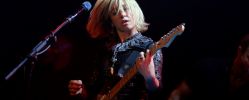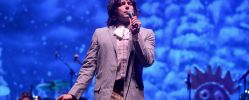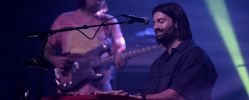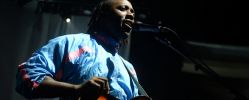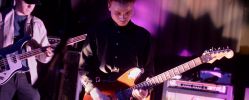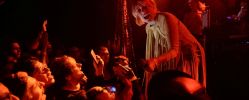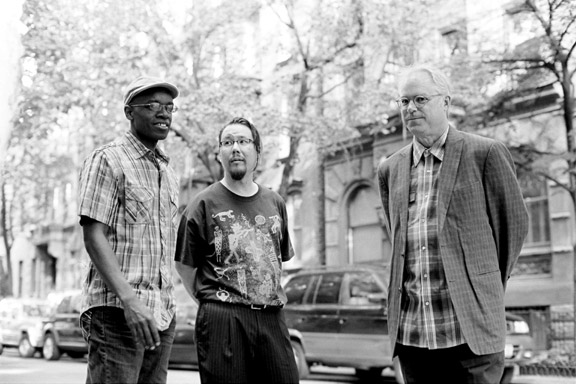
Bill Frisell Plays Largo: The Losanjealous Interview

We interviewed Bill Frisell, the Seattle-based guitarist and all-around nice guy, a few months ago. He’s coming back to LA with another new trio – this time with Eyvind Kang on viola and Rudy Royston on drums (we’ve got a shot at tickets for you at the end of this article). The new trio plays several new compositions and a few choice covers on his new album, Beautiful Dreamers. Losanjealous caught up with Bill in the Bay Area after a long flight from Vermont.
Q: We always seem to catch you as you are getting onto or off a plane – where are you now?
BF: I am in the Bay Area, I think (laughs) – I just got here from an artist residency in Vermont; way, way up in northern Vermont almost to Canada. I was there for about a month, just writing music.
Q: Just writing – not performing?
BF: Right, just writing. I‘ve never done anything like this before. I was the only musician there – the rest of the people were painters or sculptors – and I just had this big, blank, white room.
Q: That must have been great – do you have a full recording setup or just a guitar?
BF: I don’t write on a computer, so I just had my guitar, piles of paper, and a really good pencil. And I was writing for a band I play with – the 858 Quartet (Jenny Scheinman, Eyvind Kang, and Hank Roberts). I love writing and playing with those guys; we’ve played a bunch of times over the years, but we haven’t done an album in…I don’t know….10 years. So the music has evolved over the years but I wanted to do some new material, hopefully for an album. And they came up at the very end and we rehearsed in an old opera house or town meeting hall – a beautiful old wooden building – and we got to hear each other play some of the stuff I just wrote.
Q: Sounds great. So the new band with Eyvind Kang and Rudy Royston ….I’ve seen you play with Eyvind several times but you haven’t toured with Rudy very much have you?
BF: Right – I got to know Rudy via Ron Miles. I think I met Rudy the first time I met Ron more than 20 years ago. I knew he was great and I really wanted to play with him. We have actually played together a couple of times over the years – we played together on one of Ron’s albums – but Rudy didn’t want to travel a lot or tour. But then he recently moved to New York and now he’s rearing to go, which is great. And I have been playing with Eyvind for so long, of course, so the combination seemed like it would work. And it’s turned out great – we can play in a way that doesn’t require a lot of explanation. Even though we have only played together a few times, it just instantly felt like it was happening. We’ve connected in a really strong way. So I feel really lucky to be able to play some shows with this group. And I think I wanted to make it kind of a “real” group so I wrote a bunch of new music for us to play.
Q: Do you typically send them the music before meeting in the studio?
BF: No, we actually did four or five gigs before going into the studio to try the new material…which is kind of scary because you have to commit to playing all the new stuff in front of an audience rather than things you know will go well. But we did it and then took a lot of that into the studio.
Q: There are some great tunes on the new album. A song like, “Better Than a Machine”, for example, seems to just build and build and build. It seems like it would be great live?
BF: Well, that’s what I hope for. The tunes change a lot – they change night to night – and sometimes they take on a whole different life of their own. And a lot depends on who’s playing them. But that’s a song I hope we can kind, you know, rock out with (laughs).
Q: Do you think about how an audience will react as you write?

BF: No, writing for me is pretty haphazard. If I stop and try to think about it as I write, it just doesn’t work. That’s why this past month in Vermont was so different – I had time to let the ideas come without being interrupted at all. It actually blocks me if I worry about what a song might become. So I try to write everything as it comes and then, afterwards, take stock – ask myself what it might be good for or what it might become. But then a song changes, too, depending on who plays it. Sometimes I think it won’t work, but then I play it with someone else and they bring something to it that just makes it “lift off”.
Q: You are known for using loops and accompanying yourself onstage; do you do the same thing in the studio or do you add sounds later?
BF: No, we really pretty much did it in the studio as we would live. The album represents how we played it the day we recorded it. There are a few things we added in later, but it’s pretty authentic.
Q: On stage, it seems like you often put together these loops of sounds, almost like a puzzle, as a challenge for you and the musicians….almost as if you have to collectively find the song out of the sound. Do you think about it like that?
BF: Right! I think that’s it….or at least what I try for. I try not to have any of that stuff – the loops, the sounds – figured out beforehand. Part of what I try to do is create something that we have to resolve together…and that’s when unexpected things happen…that’s the really cool part. What I am hoping for is that we can start out with something and then work our way out of it. And that’s what makes it so fun for me — playing with friends and being able to find something new, some new energy, from the same song we’ve played hundreds of times. So this album is mostly how we’d do these songs live. We could have constructed something in the studio, put hundreds of violas on afterwards – which can be cool, too — but instead this is true to what the group sounds like.
Q: You’ve got a new label?
BF: Right – I just feel so lucky with all of that. Nonesuch was amazing for over 20 years. I had a really great situation there and we’re still great friends. There wasn’t any tension; no one stormed out of the room (laughs). But Savoy came along and they were just very anxious to put more stuff out — which is unusual in this day in age. So I wanted to do a few more things – or maybe do them faster – and it’s been pretty great. So, for example, this CD just came out and they are already asking when the new one is going to be ready (laughs).
Q: It seems like you often collaborate with violins, cellos, and other strings – do you like those sounds as a complement to your guitar?
 BF: Well, I can’t say I don’t like the instruments – I do love the sound of the violin and the viola. But it’s really about the people rather than the instruments or the sound. For me, so much of it is about the personality of these guys and how they relate to each other. I’ve been playing with many of the same guys for years in different bands and, for me, it’s really about them and what they bring to my music than it is about which instrument they are playing. Actually, about a year ago I had a gig for the 858 Quartet, but Jenny [Scheinman, violin] had just had her baby, so she couldn’t be there. So I didn’t even consider finding a stranger with a violin and asking them, “Hey, can you learn Jenny’s parts?”. I called Ron Miles (trumpet) and he played with us. And of course it was great. I just feel so lucky to have these friends – they aren’t even bandmates – they are friends that I just click with. And it seems to work. I don’t even have to explain even what we are going to play (laughs).
BF: Well, I can’t say I don’t like the instruments – I do love the sound of the violin and the viola. But it’s really about the people rather than the instruments or the sound. For me, so much of it is about the personality of these guys and how they relate to each other. I’ve been playing with many of the same guys for years in different bands and, for me, it’s really about them and what they bring to my music than it is about which instrument they are playing. Actually, about a year ago I had a gig for the 858 Quartet, but Jenny [Scheinman, violin] had just had her baby, so she couldn’t be there. So I didn’t even consider finding a stranger with a violin and asking them, “Hey, can you learn Jenny’s parts?”. I called Ron Miles (trumpet) and he played with us. And of course it was great. I just feel so lucky to have these friends – they aren’t even bandmates – they are friends that I just click with. And it seems to work. I don’t even have to explain even what we are going to play (laughs).
Q: Some fans probably still think of you as the guy in Naked City, the band you played with the 1980s. Do you still think of yourself as part of the “downtown scene”?
BF: Oh, I don’t know – “downtown scene” is just something someone else says. It’s not really how I think about it – I just think about the guys I play with. Like I said, they are just my friends. I just played with Joey Barron at the Stone and I don’t know if that’s really a scene, but we always have fun (laughs).
Q: Do you often listen to your old albums?
BF: No –I try not to. Well, that’s not true (laughs). You know, when you are recording it, it’s just super intense – and that’s the best way to hear it. And then sometimes I get to hear it again during the mixing. Or I even hear it during the mastering – that’s where you hear it on these unbelievable speakers, you know? It will never sound as good as that (laughs)! And by the time it’s done, you just don’t want to hear it again because you are also onto the next thing. But then I will unexpectedly hear it – maybe at a friend’s house or somewhere – and it takes me a second to recognize it. So, after a few years go by, you stop hearing all the things you wanted to change or do differently and hear it fresh…which is fun.
Q: You are releasing lots of live music exclusively online – is that fun for you to put things out there for a smaller group of fans?
BF: It’s been a great thing – the internet lets me put out so many things, especially live shows, that that might not ever get out in a traditional format. And there are a lot of shows that I think, “there was something really good here but it would never go out on a CD” – and maybe there are some hard core fans that might want to hear it (laughs).
Q: In The Last Waltz, the documentary about The Band’s final concerts, Robbie Robertson talks about how hard the life of a long-time traveling musician can be. He is deathly serious when he warns the interviewer that “the road will kill you.” Do you ever feel that?
BF: I kind of understand what he’s talking about. I mean, the travel part is really hard. Of course it’s a double edged sword because I am so thankful I can go out and do this – play music – as often as I do. And I get such strength from playing live. So it’s funny….you spend twenty four hours getting somewhere, you don’t really sleep or eat well, just to play for forty five minutes. Then you do it again. But that forty-five minutes somehow makes it all worthwhile. It sort of energizes you in a way nothing else can. That’s why this recent residency in Vermont was so different. I was alone, by myself, not having to deal with any of that stuff for a month. And then I ended up flying here via JFK and I was just so shocked – the lights, the people, the hurry – I sort of had to ask myself, “Whoa, is this what I do?” (laughs).
Q: Onstage, you don’t fit the mold of a stereotypical “guitarist” – no zebra-print pants, no pyrotechnics, and definitely no twenty minute solos in Dodger stadium. Is that a Bill Frisell you ever see in the future?
BF: Not really (laughs)! I’m a big fan of a nice, comfortable room with my friends or people that really want to see me. I mean, it’s great I can do what I do without always trying to figure out how to do it bigger, more extravagantly, on a bigger and bigger scale.
See Bill Frisell in a comfortable room with friends, sans zebra-print pants, at Largo on November 8th.
 TICKET GIVEAWAY / ALBUM GIVEAWAY
TICKET GIVEAWAY / ALBUM GIVEAWAY
Win tickets or a shot at the new CD Beautiful Dreamers, now: Send us an email. Include your first and last name, and mailing address for CD consideration. Lucky parties will be notified in advance of the show.
» Bill Frisell (official site)
Photo Credits:
1, 2: Beautiful Dreamers (Bill Frisell, Eyvind Kang, Rudy Royston) by Michael Wilson
3: Bill Frisell by Michael Wilson
